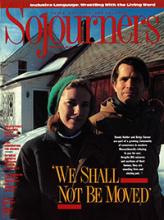Calvin Morris was professor of pastoral theology at Howard University Divinity School and assistant pastor of Gibbons United Methodist Church near Washington, D.C. when this article appeared. This article is adapted from a speech he delivered at a conference in Philadelphia on AIDS in the Minority Community: The Church's Response." Although Morris was addressing a black and Hispanic audience, and his remarks were largely directed toward the black church, his challenge to care for people who have AIDS is one that all churches must hear.
-- The Editors
PASTORAL CARE, BROADLY DEFINED, IS THE spiritual caretaking of people, both individually and collectively. Historically speaking, black churches have been the protectors of those for whom protection was lacking.
The biblical record most graphically pictures this care with the symbol of the shepherd who watches over the flock in its wanderings, meanderings, and pasturings. The shepherd protects the sheep from danger, is concerned about their welfare, seeks them when they stray, knows them by name, salves their injuries, and tends to them when ill.
The shepherd also quiets their fears and soothes their anxieties in the face of danger. The shepherd, who according to the psalmist is the Lord God, is ever present to walk alongside those who face the valleys and shadows, and to comfort those who mourn. In all these things we image and model the Good Shepherd's promise, "Lo, I will be with you always" (Matthew 28:20).
Read the Full Article

